Elon Musk Has Had Enough Of Your Shit...
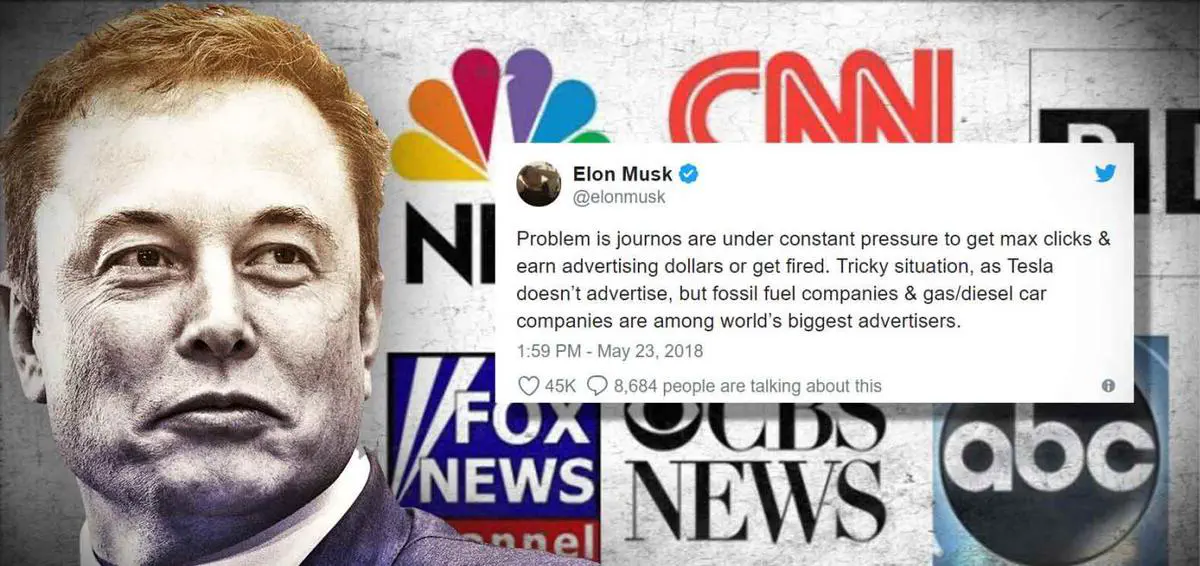
Flame on…
This, for the most part, is true. The Knight Foundation, along with Gallup, has found that Americans believe that the media plays an important role in our society. However, people don’t believe that role is being fulfilled, hence, trust in the media is at an all-time low. The reasons for the increasing distrust is up for interpretation, but that facts are clear: very few people place their complete trust in the media.
Point out this caveat and… you’re somehow aligned with the rhetoric of the President?
This, for the most part, is also true. We can find statistics going as far back as 1997 (Gallup has started asking this question since 1972) when Gallup first started to conduct these polls.
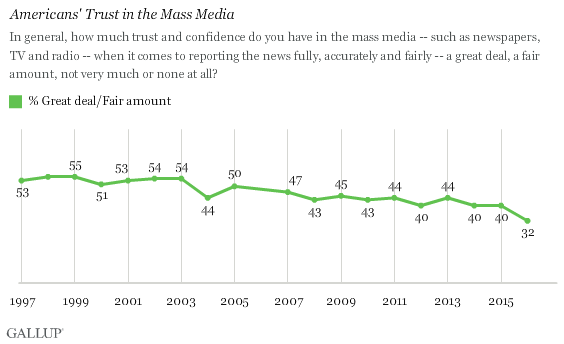
The mainstream media has eroded their trust among the public; this distrust pre-dates the Trump Presidency. There is a very popular narrative that Press Freedom is under attack. There is not much in the way of evidence to suggest that this is true.
I can’t speak to whether fossil fuel and gas/diesel car companies are among the world’s largest advertisers. It is well-known that Tesla marketing campaigns do not generate ad revenue for news outlets. It is also true that weekly circulation and Sunday circulation newspapers have seen their revenues decline for the past couple of decades. Sure, if you look at the 10-ks’ for both the New York Times and the Wall Street Journal, you’ll see that both publications have added more than 500,000 and 150,000 digital subscriptions respectively. However, these gains failed to translate into circulation growth for the overall industry.
As the traditional media loses its influence and market share to the new media (media outlets and companies that are largely digital and independent), you’ll find traditional media outlets such as the New York Times, Wall Street Journal, Washington Post, et al, will continue to publish online articles with more click-bait headlines.
How do we solve this? Elon appears to have a solution
Some key points on these statements. A journalist is merely a person who writes for newspapers, magazines, or news websites or prepares news to be broadcast via television, radio or podcast. As long as society keeps blurring the lines between “objective journalism” (e.g. Maggie Haberman) and “journalism” for the purposes of providing an opinionative analysis (e.g. Chris Hayes), we will probably need a system that rates the credibility of a journalist.
“Don’t we have fact-checkers for that?” Well, fact-checkers are an entirely different animal.
Obviously, fact-checking a news article, story, or statements by an individual (pundit, politician or otherwise) is a worthwhile endeavor. However, there doesn’t seem to be much consensus on what a “fact” is anymore. As such, whether unintentional or by default, society as assigned these “fact-checkers” as the sole arbiters of truth in our political discourse. Most journalists in the fact-checking business don’t realize how much of their ideology is baked into their fact-checking work.
It’s the only reason why you’ll have two ideologues such as Donald Trump and Bernie Sanders saying almost identical statements and receive different rating accuracies.
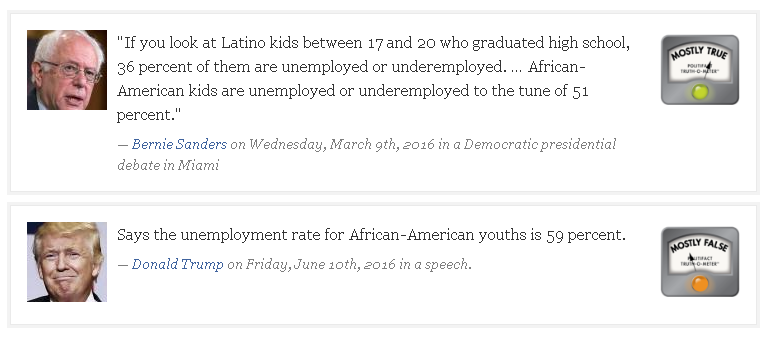
A system that allows users to rate the accuracy of a journalist can work, at least in theory. Viewers who are more partisan will more than likely downvote articles they disagree with, so the aggregate rating of journalist will be about average. However, if journalist considers themselves beholden to “the truth” as opposed to an ideology, then they should work hard to improve their overall rating.
Of course, that’s just my opinion. I wonder what other people think of this idea…
There you go; out of nearly 700,000 of Musk’s fans, 88% of them believe there are obvious problems with the media and a third-party platform should be created to deal with it. In fairness, this obviously isn’t the “every twitter users in America” poll; however, Elon Musk has a sizable audience who are more politicial engaged.
But to no avail, it didn’t help the end results of the poll…
There is some supporting evidence…
He also has some support from one of the most well-known celebrities.
Most people agree that the media should be held accountable mistruths and falsehoods they publish. Most people are unable to distinguish between an attack on the person and an attack on the work the person is reporting. Although, when someone is purposely being misleading, it is merely a distinction without a difference.
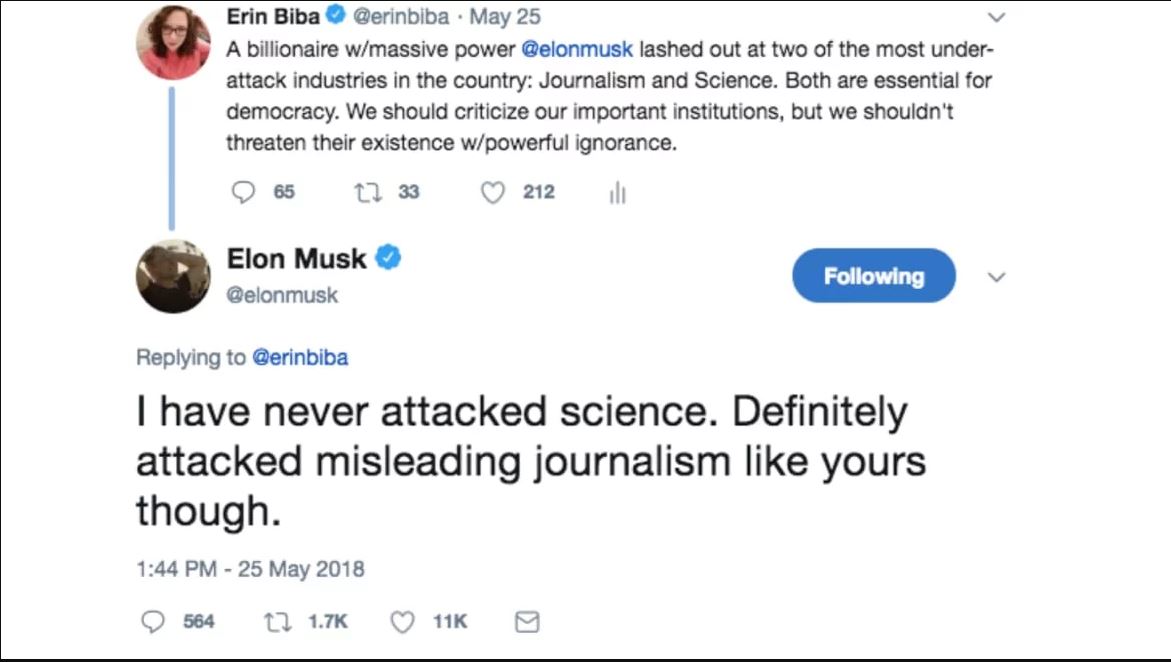
Elon Musk — the person who resigned from Trump’s Science Advisory Board for being too anti-science — is attacking science. Is there anyone out there who seriously believes this? Of course not; it’s a ridiculous assertion and Musk was correct to call her out on it. I’m guessing that Erin Biba didn’t count on Elon Musk replying directly to her tweet. Did this episode convince her to re-evaluate her preconceived notions? Was she persuaded enough to look at things from a different point of view?
Nope. It’s everyone else who is simply wrong. The mere fact that Elon Musk responded to her tweet shows that Musk doesn’t care about science or journalism and Elon Musk sends his “Musk Bros” after anyone who has a negative opinion about Musk and his company.
Where is the evidence of this? It’s in the article that Biba wrote herself, titled, “What It’s Like When Elon Musk’s Twitter Mob Comes After You.” The proof? Self-reported incidents of random online accounts harassing female journalist. She may be a science writer for Scientific American, BBC, and Wired, but I’d have to say, her reporting methods aren’t all that scientific.
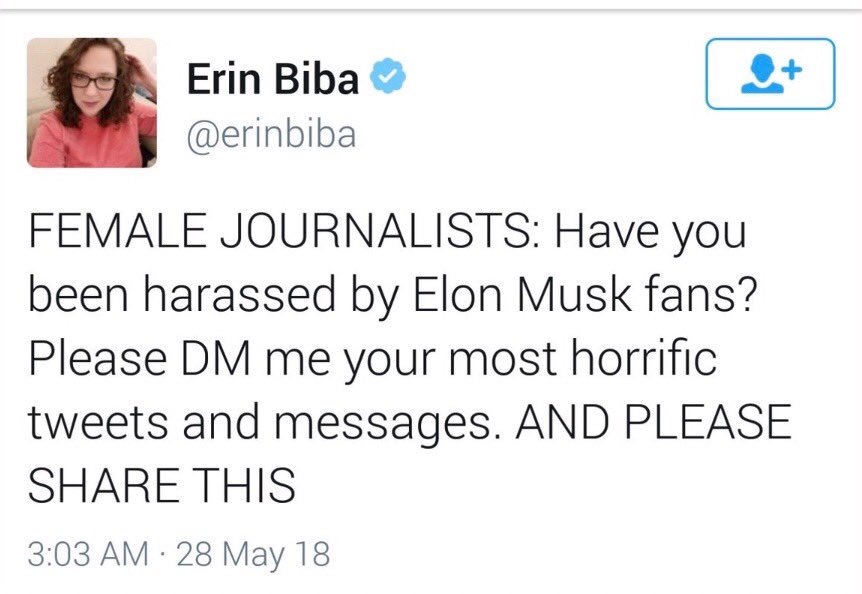
It’s media seems content with making enemies with every story it publishes. That’s fine; it’s not the role of the media to be anyone’s buddy. However, the more advanced technology becomes, the easier it is for people to share information in real time and the easier it is for the average person to learn new information at a lower cost. This means that people are able to discern for themselves what is true and what is false. As long is unable to distinguish between objective journalism and commentary journalism, fewer people will continue to trust the media.